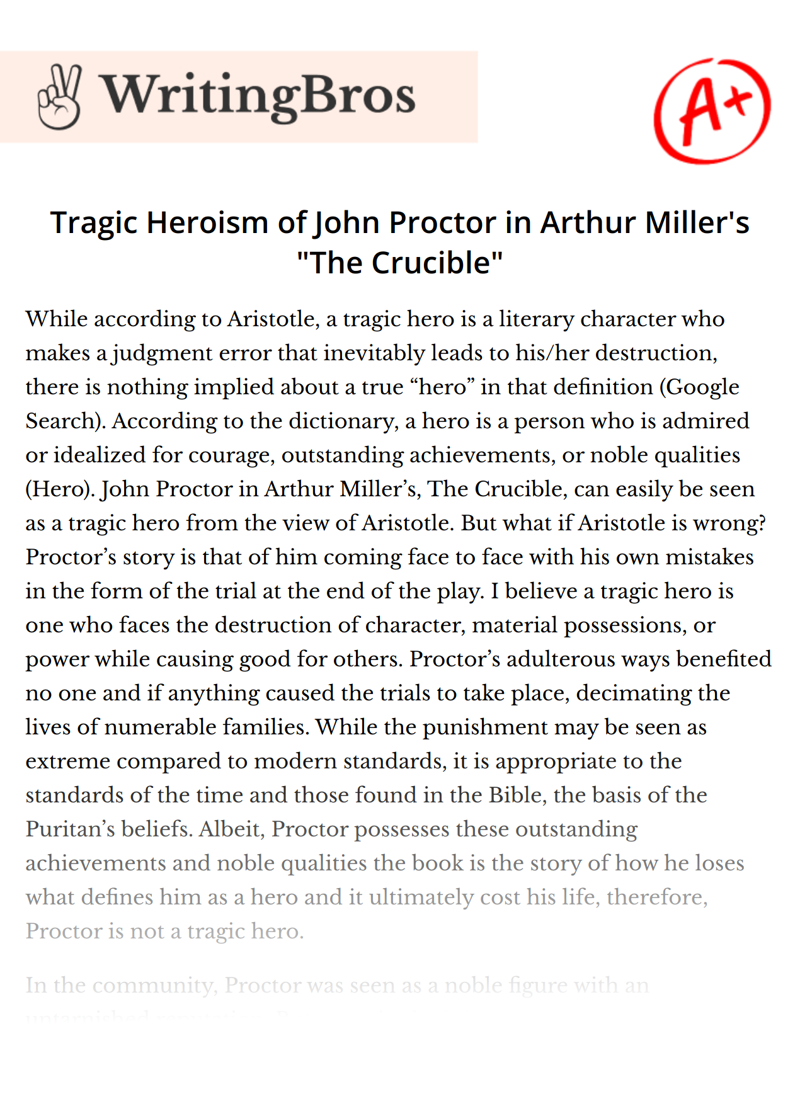Tragic Heroism of John Proctor in Arthur Miller's "The Crucible"

While according to Aristotle, a tragic hero is a literary character who makes a judgment error that inevitably leads to his/her destruction, there is nothing implied about a true “hero” in that definition (Google Search). According to the dictionary, a hero is a person who is admired or idealized for courage, outstanding achievements, or noble qualities (Hero). John Proctor in Arthur Miller’s, The Crucible, can easily be seen as a tragic hero from the view of Aristotle. But what if Aristotle is wrong? Proctor’s story is that of him coming face to face with his own mistakes in the form of the trial at the end of the play. I believe a tragic hero is one who faces the destruction of character, material possessions, or power while causing good for others. Proctor’s adulterous ways benefited no one and if anything caused the trials to take place, decimating the lives of numerable families. While the punishment may be seen as extreme compared to modern standards, it is appropriate to the standards of the time and those found in the Bible, the basis of the Puritan’s beliefs. Albeit, Proctor possesses these outstanding achievements and noble qualities the book is the story of how he loses what defines him as a hero and it ultimately cost his life, therefore, Proctor is not a tragic hero.
In the community, Proctor was seen as a noble figure with an untarnished reputation. But, even in the initial description of him, Proctor was called a “sinner not only against the moral fashion of the time but against his vision of decent conduct” (Miller 19). He knows that his affair with Abigail was shameful and he has sinned against his wife, family, Abigale, and God. But throughout the play, he still is concerned with his reputation. A man who has done such things in no sense can be called a “hero” even if a tragic one. He has constructed a guise of a reputable man, which he may have been before the events between him and Abigail transpired, but when we are allowed to observe the events he is not as such. Proctor’s opinion seems to be valued by the community in the first scene of act one. And one in those initial moments of that scene may seem to also until his interactions with Abigail unfold. For as long as possible, Proctor keeps his relationship with Abigaile a secret and only lets it unravel when members of the town are being killed.
After his affair with Abigail, Proctor and Elizebeth’s relationship changed drastically. They now seem to be walking on eggshells with each other. A man who has such a relationship with his wife simply cannot be called a hero. While the strain they have gone through emotionally is a tragedy, Proctor chose it. But, Elizebeth blames herself for his unfaithfulness in their marriage. She tells him so after his confession, “Suspicion kissed you when I did; I never knew how I should say my love. It was a cold house I kept!” (Miller 127). Proctor after his wife’s confession to him cannot even comfort her in the time of emotional unrest. He doesn’t take responsibility for his actions. While in court he was forced to confess to his affair, but only because he considers himself a “moral man” and could not lie. But in the end, he lied anyway to live.
Throughout history, we are all aware of martyrs. Some may argue that Proctor even is one because he died unnecessarily because he believed in preserving his name. But a real martyr dies for a cause in which they are devoted to. For example, Rebecca Nurse was condemned to be hanged because she would not compromise her Christian morals and admit to what she did not do. The same goes for Giles Corey. Not only did Proctor wrongly confess to witchcraft, but he also dies for an egotistical cause. The confession was the only way to live through an accusation, many did so to live. And while one may judge them for their actions in this life and death trade-off, when presented with lying to live, or doing what is right for a physical death this displayed how strong their beliefs are. A devoted Puritan or any Christian does not fear death for they know life on earth is a minuscule detail when it comes to eternal life in heaven.
John Proctor is not a tragic hero as displayed in how he deceived his community, how he deals with his unfaithfulness to his wife, and how he gave up his Puritan belief system to possess his own life. Heros do not let others believe what is not truly there. Heros do not cheat on their wives. And heroes do not give up what they originally thought they stood for. Tragedy may bring out to light a side of people that one may rather wish was not there, but no matter how desperately they wish it will not go away. Character is genuinely put to the test. And according to Aristotle, Proctor did what was expected.
Cite this Essay
To export a reference to this article please select a referencing style below

